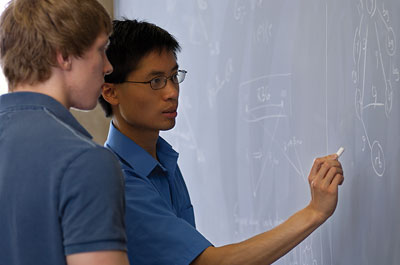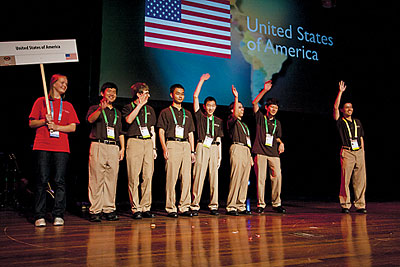
Passing the Torch
Po-Shen Loh Trains Students To Be Math Olympians
by Amy Pavlak

Po-Shen Loh working with first-year student Michael Druggan on a problem in extremal combinatorics. Druggan, a former Olympiad student, is one of five recipients of the new Knaster-McWilliams Scholarship, established in 2011 by alumni Alexander M. Knaster and Bruce McWilliams.

Team U.S.A. at the 2011 International Math Olympiad opening ceremony in Amsterdam. From left: Wenyu Cao, Benjamin Gunby, Xiaoyu He, Mitchell Lee, Evan O’Dorney, David Yang and Deputy Leader Po-Shen Loh.
The Americans had their game faces on. They landed in Amsterdam days earlier and were about to go head-to-head with 500 of the world’s brightest math students. The six high school students representing the United States at the International Math Olympiad looked to their coach one last time before walking into the cavernous room where they would spend the next four-and-a-half hours working through some of the most challenging math problems they had ever faced. Their coach, deputy team leader Po-Shen Loh, did his best to prepare his team to stay focused and calm as they dug deep into their raw ability to tackle the tough math ahead. And Loh wasn’t just telling them what he thought they needed to hear. He was speaking from experience. Twelve years earlier, long before he ever dreamed he’d be an assistant professor of mathematical sciences at Carnegie Mellon, he stood in the exact same spot—and walked away with a silver medal.
Loh plunged into the Math Olympiad as a freshman at James Madison Memorial High School in Madison, Wis., when he and 250,000 students across the country took the first qualifying exam for the U.S. Math Olympiad program. He passed the first test, and the second, and the third, becoming one of 60 students to qualify for the training program that takes place every summer in Lincoln, Neb.
“It was the highlight of every year to go there and be with people who thought the same way I did and who I could do math with all day. My best friends were the ones I met at those programs. And they still are,” Loh said.
After high school, Loh attended Caltech on a full-tuition scholarship. He thrived there, earning numerous honors, including a Churchill Scholarship and a Hertz Fellowship, and graduating at the top of his class. He also met a geophysics major, Debbie Lee, whom he married the day before graduation.
While earning his Ph.D. at Princeton, Loh led a full life. He and his wife welcomed two children (a girl and a boy) in two years, and his research kept him busy. But he still longed for his Math Olympiad days. So in 2002, he returned to Nebraska for the summer program. This time around, Loh taught classes and did a one-year stint in 2004 as the U.S. deputy team leader. In 2010 he became the U.S. deputy team leader again and plans to continue in that role for the foreseeable future.
The Math Olympiad training program, affectionately known as MOP, is an intense four weeks for 60 of America’s brightest math students. Their days are filled with working math problems, talking about math problems, eating lunch while discussing math problems—and having a blast doing it.
Even though Loh now wears the instructor-and-deputy-leader hat, he still enjoys every minute of it. He has as much fun as his students do, something that isn’t lost on them.
“Po-Shen is everyone’s favorite instructor because he’s so engaging and so enthusiastic,” said Maria Monks, a former student of Loh’s who is currently a Churchill Scholar at Cambridge University. “At the lunch table, he always has a billion kids gathered around him just listening to him talk.”
Loh also teaches Carnegie Mellon’s math students with the same gusto. Since he joined the faculty in 2010, he has taught a number of classes, including the Putnam seminar, which is a course for students interested in competing in a math contest for college students called the Putnam Competition. Junior math and computer science major Terry Zhou, who competed in the Putnam last year, admits that the Putnam problems were really hard, but he knows that Loh prepared him well.
“Po-Shen breaks down the problems into parts and shows you various intuitive methods to make hard problems easier. That’s the charm of Po-Shen—he explains how to think through the problem in an intuitive way.”
Loh will tell you that successful problem solving takes practice.
“Problems have different levels of difficulty, which basically corresponds to how many leaps, how many new things you have to invent. You start with easier problems that have fewer leaps. Eventually your brain gets used to making these leaps and you start inventing things faster.”
Loh knows that this type of training will help students in whatever they do because it has helped him tremendously in his own research at the intersection of combinatorics, probability and theoretical computer science. Loh most enjoys tackling problems in unusual ways—ways people haven’t tried before. And it comes naturally to him because he has gotten used to it. This real-world lesson is something Loh wants to bring to MOP students.
“I view my role now as one where I’m trying to help bring students a bridge from competitions to college to research math and so on. I’m there to train them for the contest, but I’d like to show them how to move on too,” he said.
But during the heat of competition, Loh takes his job as deputy leader very seriously. And it shows. The 2011 U.S. team finished in second place.